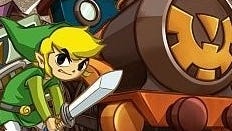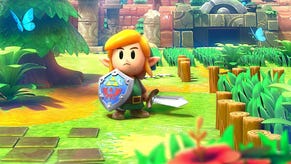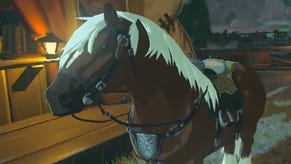The Legend of Zelda: Spirit Tracks
Full steam ahead.
As revealed earlier this month, the eponymous princess tags along with Link for the first time in the series in spirit form. It's not exactly a massive spoiler if you think through this logically to conclude that something rather unfortunate must have befallen the poor lass, which is explained in the beginning.
A Nintendo rep tells me Zelda's spirit performs a similar function to that of Navi in Ocarina of Time. Moreover, she is able to 'possess' phantom characters, which can then be directed and will likely form a cornerstone of the game's puzzle-solving. The introduction to this mechanic is gentle: in the first dungeon, once Link has collected three Tears of Light to power-up his sword, he can disable a phantom for Zelda. The phantom can then be controlled by drawing its path with the stylus, called upon to follow Link, and stood on from higher ground, essential to navigating certain areas and seeing-off raised enemies.
Link's also been working on his musical repertoire. Once the Spirit Pipes are picked up, specific tunes can be learned and played ocarina-like in front of Spirit Stones to engage certain effects, such as exposing all the hidden chests in area. To play, you hold the stylus over one of the coloured pipes, and blow into the microphone. Expect violent assaults on public transport to soar in the game's wake.
The mic is also used for the Whirlwind power, acquired in the first dungeon, which is necessary to disperse impenetrable black clouds obscuring the screen and attack certain enemies. I also briefly get to try out Link's new Indiana Jones-style whip, used for lashing baddies and doubling-up as an improvised swing to cross pits.
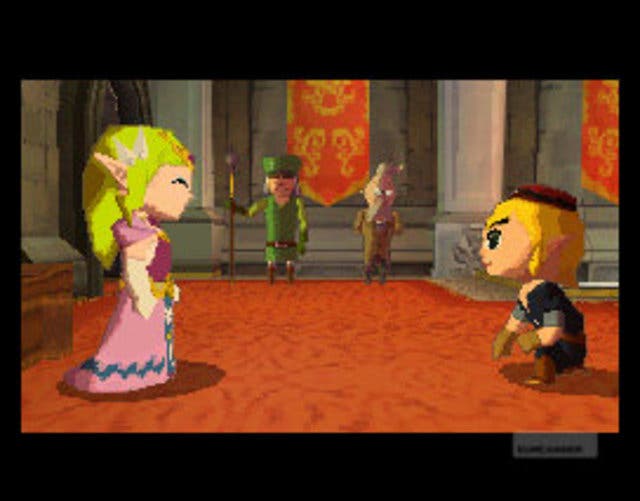
Aonuma and his team have addressed one of the main criticisms levelled at Phantom Hourglass with the Spirit Tower. Where, in the previous game, frustrating repeated playthroughs of the hub dungeon were required just to push through a little further each time, new sections are now hidden behind doors along a spiral staircase within the tower. As each boss is vanquished, Link and Zelda enter a side-room where a train is waiting for the princess to enchant the next section of track.
The Zelda timeline is a curious thing, allowing for echoes of previous adventures to emerge in the unlikeliest of places. Spirit Tracks proudly maintains this feature, and veterans of the series will feel that familiar twang of deja vu in encounters with people and places, an element I've always found gives the experience a consoling circularity.
One thing I do see for the first time is multiplayer. In Phantom Hourglass, a one-on-one battle mode was included, but Aonuma has expanded this for the sequel with up to four Links able to compete against each other.
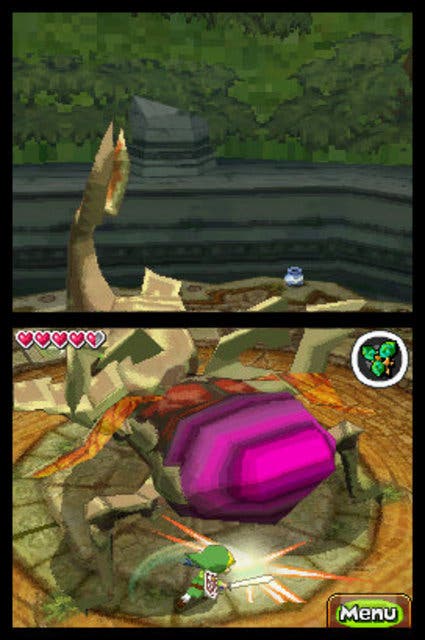
A range of arenas is available, ranked according to difficulty and offering a variety of conditions, from rising and falling lava pits, to maps with invisibility sections where rivals disappear from the location map. The aim is simply to be the Link with the most gems as time runs out.
I play a couple a games against Aonuma and another guy. The designer shrieks and howls with competitive delight, never letting his broad grin slip, as we all scramble for gems, setting off booby traps, fleeing phantoms and hurling bombs at each other. It's uproarious fun for 10 minutes: whether it sustains interest in the longer term, we'll have to wait and see.
Fans of The Legend of Zelda know what to expect by now: and where Spirit Tracks is ultimately placed in the Nintendo pantheon will depend, as ever, on the levels of invention, charm and engagement Aonuma and the rest of his team at Nintendo EAD are able to conjure.
Just before I leave I ask him if he's doing anything fun before he heads home. With a twinkle in his eye he tells me he's going to spend his final free morning going to King's Cross station to get his photo taken by the Harry Potter platform "for my son". For your son? Yeah, right.
The Legend Of Zelda: Spirit Tracks releases exclusively for DS on 11th December.

